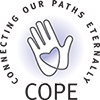 Each of us grieves the loss of a child, or any other significant loss, in our own way. And each of us has our own way of coping with our grief. Some bereaved parents may benefit from seeing a therapist, attending a support group, talking to friends or being with family. Still others may simply need time alone to come to grips with their emotions. There really is no right or wrong way to grieve.
Each of us grieves the loss of a child, or any other significant loss, in our own way. And each of us has our own way of coping with our grief. Some bereaved parents may benefit from seeing a therapist, attending a support group, talking to friends or being with family. Still others may simply need time alone to come to grips with their emotions. There really is no right or wrong way to grieve.
The following is a list of suggestions that may help grieving parents in their journey. But remember, everyone’s journey is unique. And each part of the journey can be different. So even if something doesn’t work for you now, it may help you during another leg of your journey.
Give yourself permission
As you travel your grief journey, you will encounter many things that you did not expect to encounter since your world was turned upside down. Give yourself permission to experience the feelings, emotions and thoughts that emerge as you figure out how to live with and in spite of your loss.
Expect the unexpected
You already know that life is unpredictable. Grief, and the impact it has on your mind and body, may also surprise you. Be prepared; some experience physical symptoms like nausea and headaches. Others find their mind is foggy, and they have difficulty remembering details. Always check with your physician if you experience new or unusual physical symptoms. But give yourself time and space to adjust to your loss.
Get Support
Support can mean different things to different people. For some, nothing can replace the validating feeling when someone else truly understands what they are going through. Attending a support group with other parents grieving the loss of their children can be a profound and uniquely connecting experience. For others, finding an individual therapist who provides them with the opportunity to share what they can’t share anywhere else can also be a great help. And for others, alternative healing therapies may be the best option. And remember, what doesn’t seem to work for you now may work for you later.
Engage in self-care
Even though it may be difficult, it is essential that you get enough to eat and enough exercise. Your body is carrying you through this journey, and you need to keep it working. Take a yoga class; take a walk. Try to stay as active as you can. Get outside and breathe.
Accept help
It may feel as if no one can help you at this time, but accepting people’s offers of help is a way to stay connected. Let them do your grocery shopping or bring you a meal, or just take a walk with you. They are looking for ways to help you during this time.
Set realistic expectations for yourself
This is the hardest journey you will ever make, so be realistic about what to expect from yourself. Get information. The internet has great resources, the library has books on coping with grief, and grief support organizations in your area have educational materials about what is realistic to expect as you progress through your journey.
Create Rituals
Honoring the memory of your child is crucial to integrating the loss of him/her into your life. For some, regular cemetery visits or keeping the grave clean with flowers is a helpful ritual. For others, it is doing something special on their child’s birthday. In December there are often opportunities to participate in memorial candle lightings. It is important to find the rituals that work for you and honor your child’s memory.
Gather photos and other things that evoke good memories
Having photos of your child around your home can be both healing and beneficial. Most of the time, the photos we save are those in which people are smiling and happy. Having some articles of your child’s clothing made into a quilt can be comforting to you when you wrap yourself in it.
Identify your grief triggers and plan ahead
Unfortunately, you can’t always know what song, smell or image will trigger your emotions. But you will start to recognize your triggers. Take care of yourself by avoiding situations that will be triggering, or make sure to have an escape plan.
Have a grief emergency toolkit
Because everyone’s grief is unique, their toolkits will be unique to them. But here are some guidelines for what to pack:
- A safe place—this could be an actual place where you find comfort, like curled up on your couch wrapped in an article of your loved one’s clothing, or it could be the friend you know you can run to, who will listen without judging.
- Snacks—not necessarily limited to food, but other things that nourish you. For some this is a meaningful book or a piece of music. For others, this might be some comfort food—perhaps your lost loved one’s favorite.
- Water—If it’s summer, definitely stay hydrated in the literal sense of the word. But you should also consider for your toolkit, what is it that brings you back from feeling parched? For some helping someone else adds meaning to their moment. For others an activity, exercise or a project is rejuvenating.
Think about what helps you when you hit a bump in the road. Make your own personal list of what should go into your toolkit. And then remember to use it.
